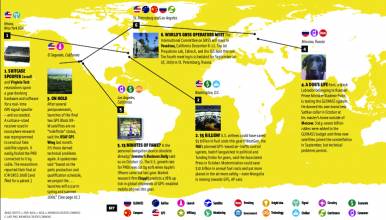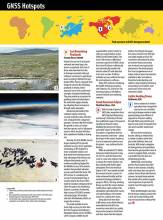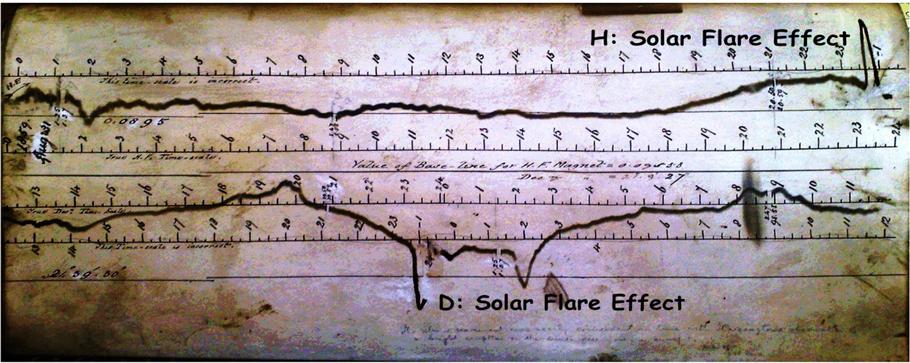 One of 12 magnetograms recorded at Greenwich Observatory during the Great Geomagnetic Storm of 1859
One of 12 magnetograms recorded at Greenwich Observatory during the Great Geomagnetic Storm of 1859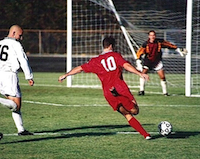 1996 soccer game in the Midwest, (Rick Dikeman image)
1996 soccer game in the Midwest, (Rick Dikeman image)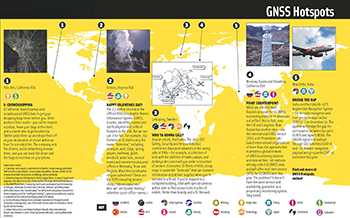
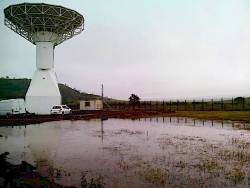 Nouméa ground station after the flood
Nouméa ground station after the flood A pencil and a coffee cup show the size of NASA’s teeny tiny PhoneSat
A pencil and a coffee cup show the size of NASA’s teeny tiny PhoneSat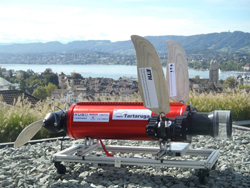 Bonus Hotspot: Naro Tartaruga AUV
Bonus Hotspot: Naro Tartaruga AUV
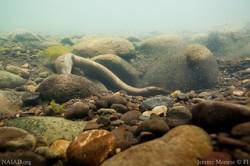 Pacific lamprey spawning (photo by Jeremy Monroe, Fresh Waters Illustrated)
Pacific lamprey spawning (photo by Jeremy Monroe, Fresh Waters Illustrated) “Return of the Bucentaurn to the Molo on Ascension Day”, by (Giovanni Antonio Canal) Canaletto
“Return of the Bucentaurn to the Molo on Ascension Day”, by (Giovanni Antonio Canal) Canaletto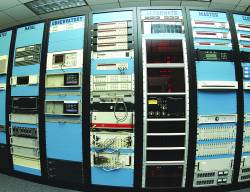 The U.S. Naval Observatory Alternate Master Clock at 2nd Space Operations Squadron, Schriever AFB in Colorado. This photo was taken in January, 2006 during the addition of a leap second. The USNO master clocks control GPS timing. They are accurate to within one second every 20 million years (Satellites are so picky! Humans, on the other hand, just want to know if we’re too late for lunch) USAF photo by A1C Jason Ridder.
The U.S. Naval Observatory Alternate Master Clock at 2nd Space Operations Squadron, Schriever AFB in Colorado. This photo was taken in January, 2006 during the addition of a leap second. The USNO master clocks control GPS timing. They are accurate to within one second every 20 million years (Satellites are so picky! Humans, on the other hand, just want to know if we’re too late for lunch) USAF photo by A1C Jason Ridder. 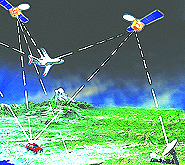 Detail of Compass/ BeiDou2 system diagram
Detail of Compass/ BeiDou2 system diagram Hotspot 6: Beluga A300 600ST
Hotspot 6: Beluga A300 600ST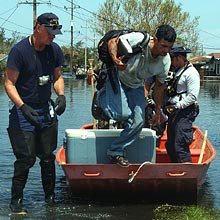

1. HAPPY BIRTHDAY!
Los Angeles, California USA
√ Congratulations to SVN 23, a GPS IIA satellite, for 20 glorious years. The GPS Directorate expects 12–18 months more of active duty from the overachieving space vehicle, which was expected to last only 7½ years. (Meanwhile, Europe’s first Galileo test satellite, GIOVE-A, was expected to last 27 months and is still cookin’ after five years.)
1. HAPPY BIRTHDAY!
Los Angeles, California USA
√ Congratulations to SVN 23, a GPS IIA satellite, for 20 glorious years. The GPS Directorate expects 12–18 months more of active duty from the overachieving space vehicle, which was expected to last only 7½ years. (Meanwhile, Europe’s first Galileo test satellite, GIOVE-A, was expected to last 27 months and is still cookin’ after five years.)
GPS Directorate, Los Angeles AFB: Global Positioing System Satellite Achieves 20 Years On-Orbit
European Space Agency: Galileo pathfinder GIOVE-A achieves five years in orbit
2. EMOTIONAL INTELLIGENCE
Cambridge, England
√ Watch out . . . your GPS unit soon may be empathic enough to change voice tones, decrease volume, and stop repeating instructions if you’re feeling grouchy. Cambridge University computer scientist Peter Robinson was so frustrated by his “difficult” GPS “built by sadists” that he and his researchers created a robotic prototype that identifies a driver’s feelings 70% of the time.
- See Professor Robinson and “Charles” in action
- University of Cambridge – “The Emotional Computer”
- Cambridge Computer Laboratory “Rainbow Research Group”: Emotionally Intelligent Interfaces
3. THE SATELLITES’ WAY
The Camino, Galicia, Spain
√ Last fall, a dozen pilgrims with disabilities covered 460 miles on the 1,000-year-old Way of St. James, a Christian pilgrimage from France to Galicia in northern Spain. They demonstrated tools that combine GPS, MP3, radio and audio, smart phones, and the web to show that satellite technologies make even the tough Camino accessible.
- The Satellites’ Way
- EGNOS “Modern Pilgrims Boost Satellite Navigation for All”
4. FIRST TIME
Dubai, United Arab Emirates
√ Time for the Middle East to get its own GNSS? In January, the UN International Committee on GNSS and the U.S. State Department organized the first regional workshop on GNSS in Dubai. “UAE officials could take the lead in incorporating existing systems in various applications and research, and creating [suitable] mapping . . . or reference systems,” said ICG program officer Sharafat Gadimova in The National, a UAE newspaper.
- The National article
5. PAX PACIFICA
Tokyo, Japan
√ Government representatives from Japan and the United States met in Tokyo on January 13 for the eighth time since 1998 to reaffirm space-based PNT cooperation between the countries — free access, no direct user fees and interoperability among GPS, QZSS, MSAT, and WAAS — And to say that GNSS is indispensable to modern life and to Asia-Pacific development.
- “Joint Announcement on United States-Japan GPS Cooperation”
U.S. Department of State website
Ministry of Foreign Affairs of Japan website

